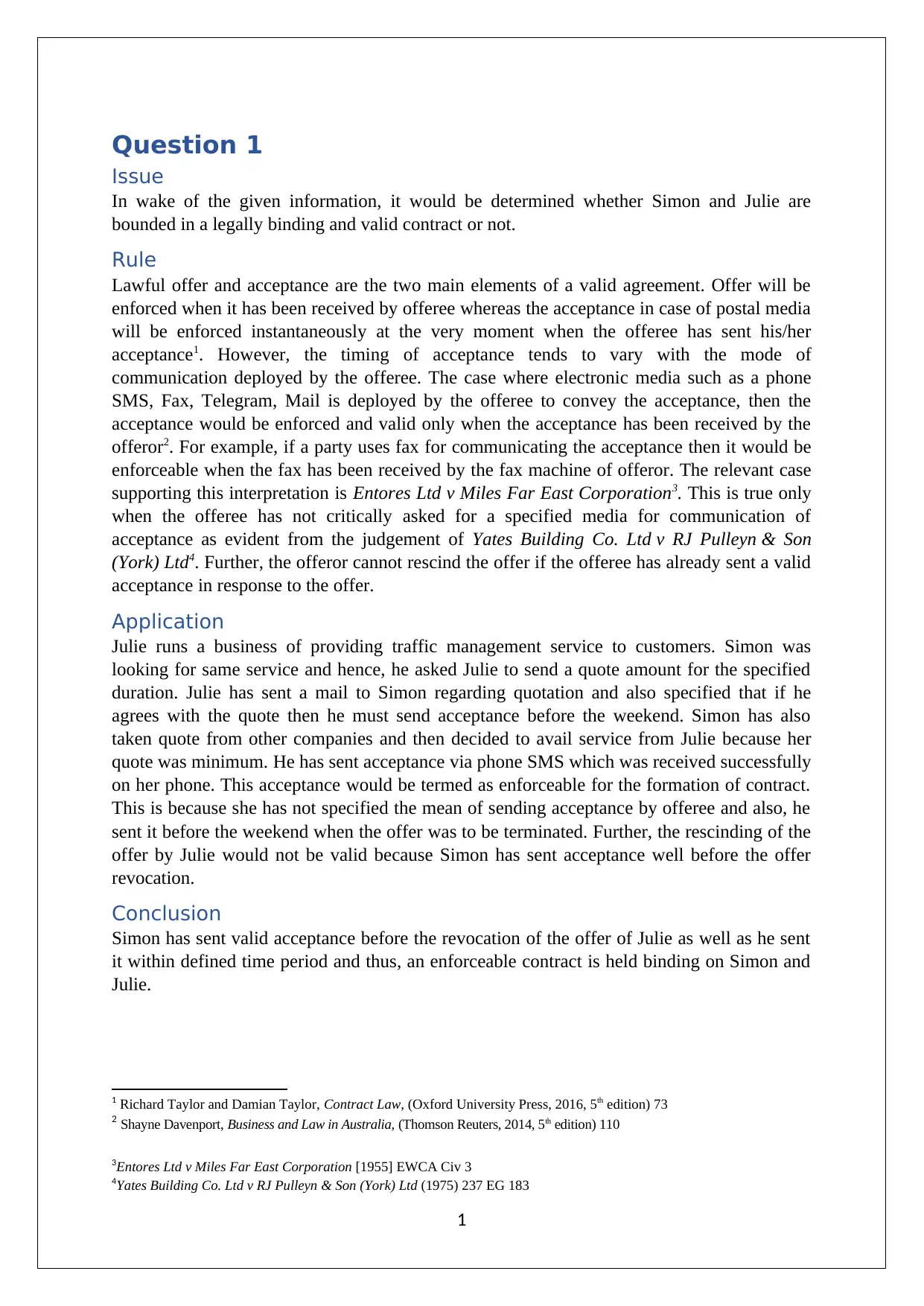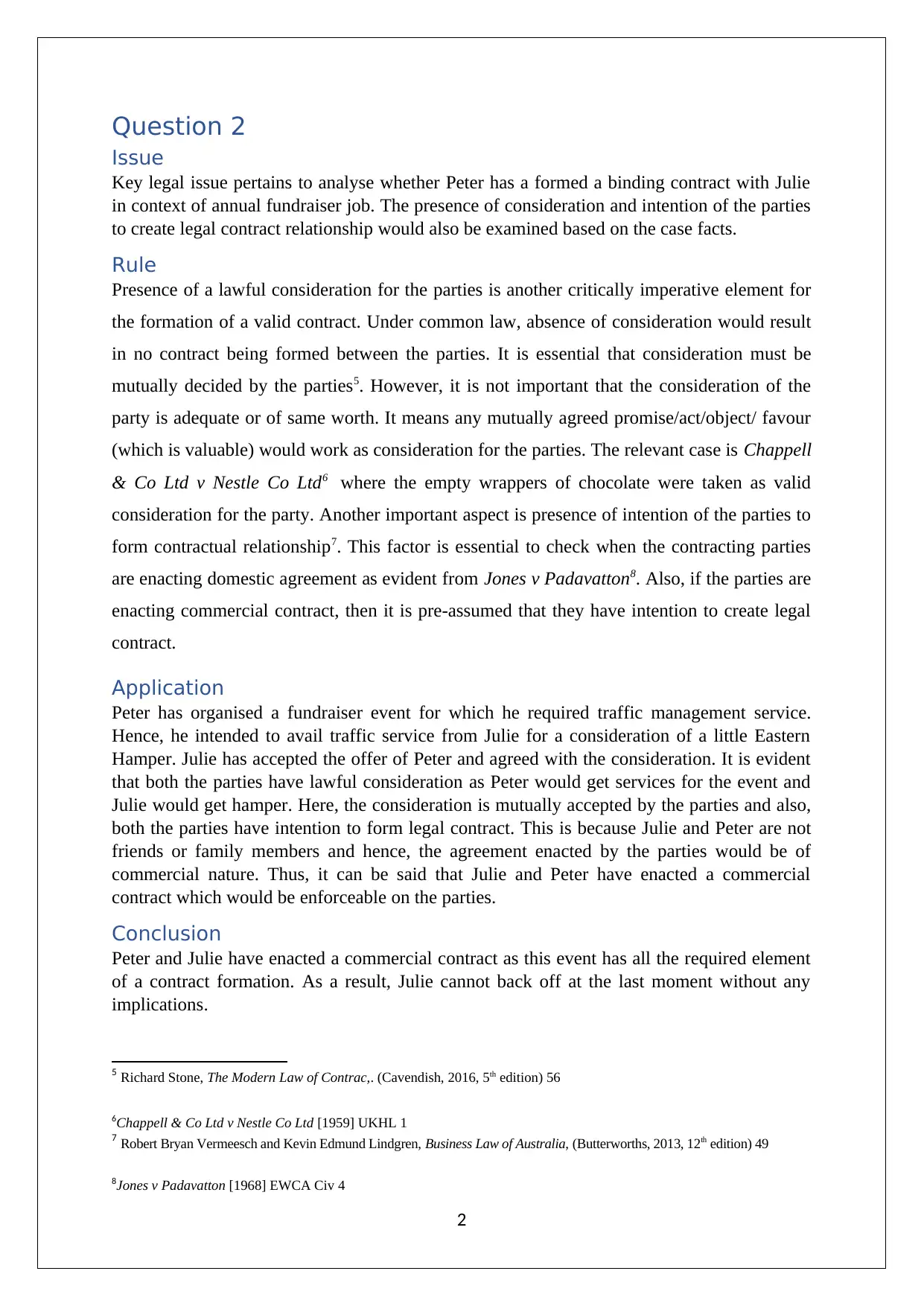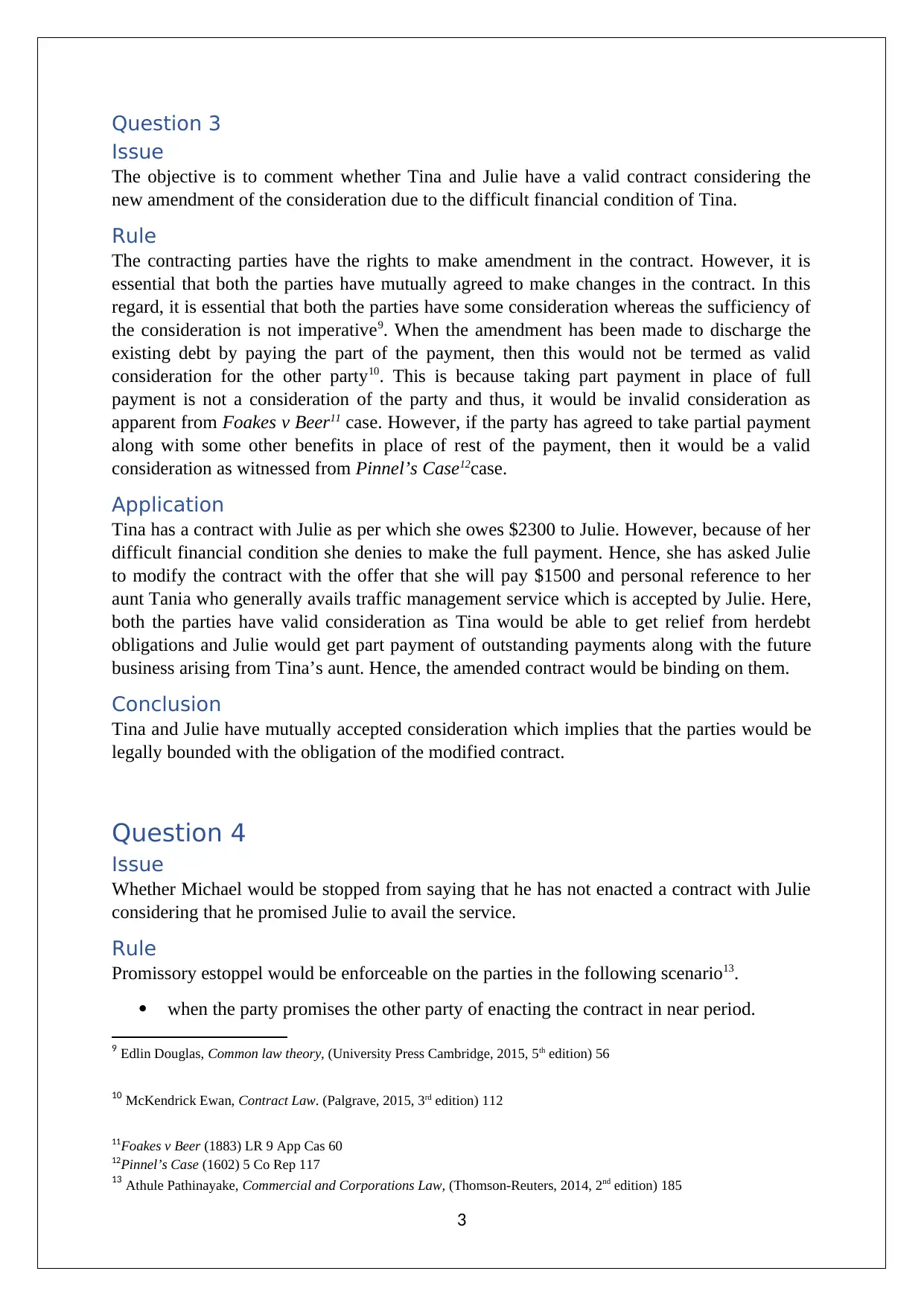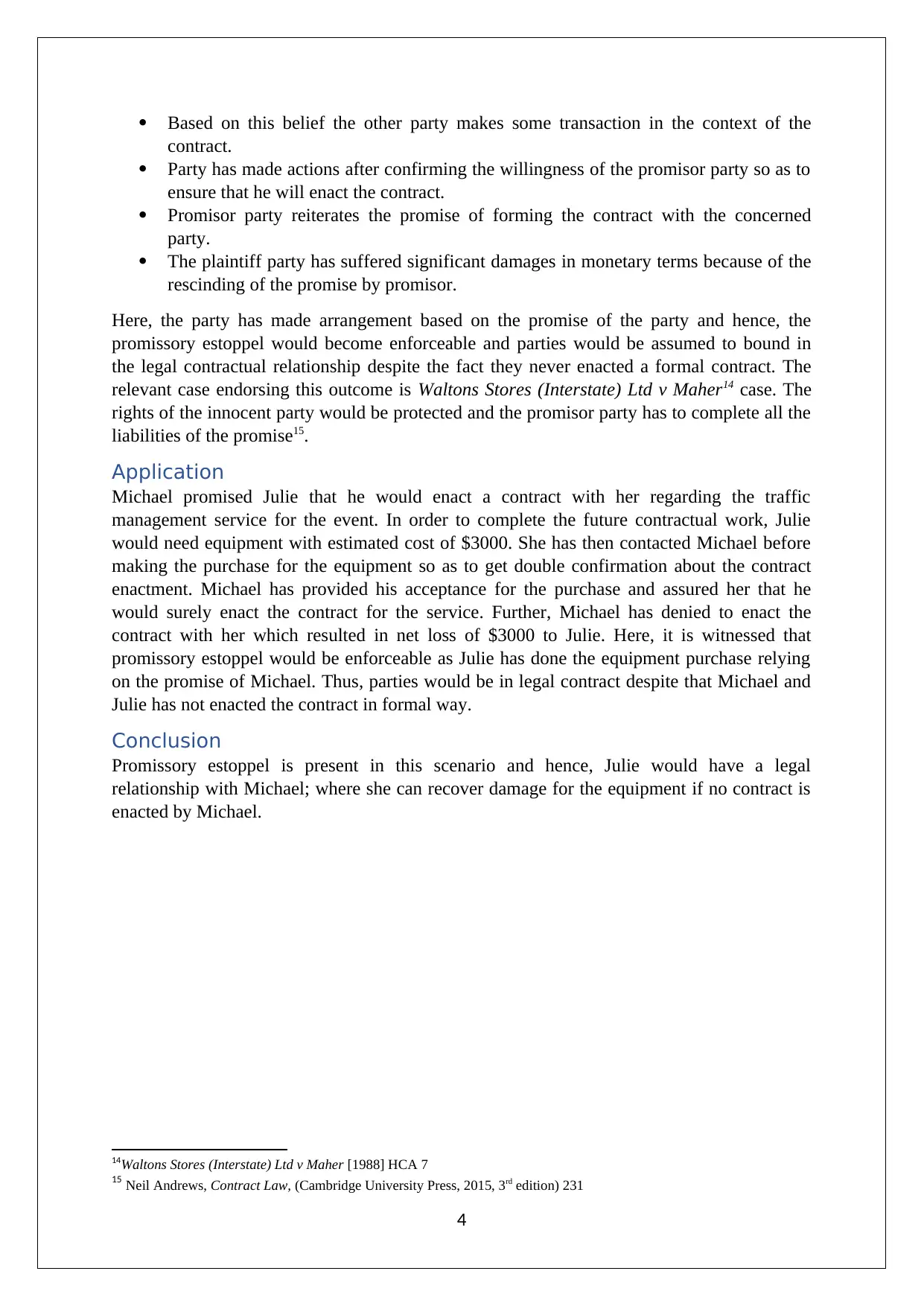Business Law Common Law Assignment - Semester 1, 2019
VerifiedAdded on 2023/01/19
|5
|1882
|21
Homework Assignment
AI Summary
This assignment analyzes several contract law scenarios. The first question examines the formation of a valid contract through offer and acceptance, focusing on the timing and method of acceptance. The second question assesses the presence of consideration and intention to create legal relations in a fundraiser agreement. The third question deals with contract modifications due to financial hardship, examining the validity of amended consideration. Finally, the fourth question explores promissory estoppel, determining whether a party is bound by a promise even without a formal contract, considering reliance and detriment. Each question includes a rule, application, and conclusion, supported by relevant case law and legal principles from the provided textbook. The assignment demonstrates an understanding of contract law fundamentals and their practical application.

Paraphrase This Document
Need a fresh take? Get an instant paraphrase of this document with our AI Paraphraser

Question 1
Issue
In wake of the given information, it would be determined whether Simon and Julie are
bounded in a legally binding and valid contract or not.
Rule
Lawful offer and acceptance are the two main elements of a valid agreement. Offer will be
enforced when it has been received by offeree whereas the acceptance in case of postal media
will be enforced instantaneously at the very moment when the offeree has sent his/her
acceptance1. However, the timing of acceptance tends to vary with the mode of
communication deployed by the offeree. The case where electronic media such as a phone
SMS, Fax, Telegram, Mail is deployed by the offeree to convey the acceptance, then the
acceptance would be enforced and valid only when the acceptance has been received by the
offeror2. For example, if a party uses fax for communicating the acceptance then it would be
enforceable when the fax has been received by the fax machine of offeror. The relevant case
supporting this interpretation is Entores Ltd v Miles Far East Corporation3. This is true only
when the offeree has not critically asked for a specified media for communication of
acceptance as evident from the judgement of Yates Building Co. Ltd v RJ Pulleyn & Son
(York) Ltd4. Further, the offeror cannot rescind the offer if the offeree has already sent a valid
acceptance in response to the offer.
Application
Julie runs a business of providing traffic management service to customers. Simon was
looking for same service and hence, he asked Julie to send a quote amount for the specified
duration. Julie has sent a mail to Simon regarding quotation and also specified that if he
agrees with the quote then he must send acceptance before the weekend. Simon has also
taken quote from other companies and then decided to avail service from Julie because her
quote was minimum. He has sent acceptance via phone SMS which was received successfully
on her phone. This acceptance would be termed as enforceable for the formation of contract.
This is because she has not specified the mean of sending acceptance by offeree and also, he
sent it before the weekend when the offer was to be terminated. Further, the rescinding of the
offer by Julie would not be valid because Simon has sent acceptance well before the offer
revocation.
Conclusion
Simon has sent valid acceptance before the revocation of the offer of Julie as well as he sent
it within defined time period and thus, an enforceable contract is held binding on Simon and
Julie.
1 Richard Taylor and Damian Taylor, Contract Law, (Oxford University Press, 2016, 5th edition) 73
2 Shayne Davenport, Business and Law in Australia, (Thomson Reuters, 2014, 5th edition) 110
3Entores Ltd v Miles Far East Corporation [1955] EWCA Civ 3
4Yates Building Co. Ltd v RJ Pulleyn & Son (York) Ltd (1975) 237 EG 183
1
Issue
In wake of the given information, it would be determined whether Simon and Julie are
bounded in a legally binding and valid contract or not.
Rule
Lawful offer and acceptance are the two main elements of a valid agreement. Offer will be
enforced when it has been received by offeree whereas the acceptance in case of postal media
will be enforced instantaneously at the very moment when the offeree has sent his/her
acceptance1. However, the timing of acceptance tends to vary with the mode of
communication deployed by the offeree. The case where electronic media such as a phone
SMS, Fax, Telegram, Mail is deployed by the offeree to convey the acceptance, then the
acceptance would be enforced and valid only when the acceptance has been received by the
offeror2. For example, if a party uses fax for communicating the acceptance then it would be
enforceable when the fax has been received by the fax machine of offeror. The relevant case
supporting this interpretation is Entores Ltd v Miles Far East Corporation3. This is true only
when the offeree has not critically asked for a specified media for communication of
acceptance as evident from the judgement of Yates Building Co. Ltd v RJ Pulleyn & Son
(York) Ltd4. Further, the offeror cannot rescind the offer if the offeree has already sent a valid
acceptance in response to the offer.
Application
Julie runs a business of providing traffic management service to customers. Simon was
looking for same service and hence, he asked Julie to send a quote amount for the specified
duration. Julie has sent a mail to Simon regarding quotation and also specified that if he
agrees with the quote then he must send acceptance before the weekend. Simon has also
taken quote from other companies and then decided to avail service from Julie because her
quote was minimum. He has sent acceptance via phone SMS which was received successfully
on her phone. This acceptance would be termed as enforceable for the formation of contract.
This is because she has not specified the mean of sending acceptance by offeree and also, he
sent it before the weekend when the offer was to be terminated. Further, the rescinding of the
offer by Julie would not be valid because Simon has sent acceptance well before the offer
revocation.
Conclusion
Simon has sent valid acceptance before the revocation of the offer of Julie as well as he sent
it within defined time period and thus, an enforceable contract is held binding on Simon and
Julie.
1 Richard Taylor and Damian Taylor, Contract Law, (Oxford University Press, 2016, 5th edition) 73
2 Shayne Davenport, Business and Law in Australia, (Thomson Reuters, 2014, 5th edition) 110
3Entores Ltd v Miles Far East Corporation [1955] EWCA Civ 3
4Yates Building Co. Ltd v RJ Pulleyn & Son (York) Ltd (1975) 237 EG 183
1

Question 2
Issue
Key legal issue pertains to analyse whether Peter has a formed a binding contract with Julie
in context of annual fundraiser job. The presence of consideration and intention of the parties
to create legal contract relationship would also be examined based on the case facts.
Rule
Presence of a lawful consideration for the parties is another critically imperative element for
the formation of a valid contract. Under common law, absence of consideration would result
in no contract being formed between the parties. It is essential that consideration must be
mutually decided by the parties5. However, it is not important that the consideration of the
party is adequate or of same worth. It means any mutually agreed promise/act/object/ favour
(which is valuable) would work as consideration for the parties. The relevant case is Chappell
& Co Ltd v Nestle Co Ltd6 where the empty wrappers of chocolate were taken as valid
consideration for the party. Another important aspect is presence of intention of the parties to
form contractual relationship7. This factor is essential to check when the contracting parties
are enacting domestic agreement as evident from Jones v Padavatton8. Also, if the parties are
enacting commercial contract, then it is pre-assumed that they have intention to create legal
contract.
Application
Peter has organised a fundraiser event for which he required traffic management service.
Hence, he intended to avail traffic service from Julie for a consideration of a little Eastern
Hamper. Julie has accepted the offer of Peter and agreed with the consideration. It is evident
that both the parties have lawful consideration as Peter would get services for the event and
Julie would get hamper. Here, the consideration is mutually accepted by the parties and also,
both the parties have intention to form legal contract. This is because Julie and Peter are not
friends or family members and hence, the agreement enacted by the parties would be of
commercial nature. Thus, it can be said that Julie and Peter have enacted a commercial
contract which would be enforceable on the parties.
Conclusion
Peter and Julie have enacted a commercial contract as this event has all the required element
of a contract formation. As a result, Julie cannot back off at the last moment without any
implications.
5 Richard Stone, The Modern Law of Contrac,. (Cavendish, 2016, 5th edition) 56
6Chappell & Co Ltd v Nestle Co Ltd [1959] UKHL 1
7 Robert Bryan Vermeesch and Kevin Edmund Lindgren, Business Law of Australia, (Butterworths, 2013, 12th edition) 49
8Jones v Padavatton [1968] EWCA Civ 4
2
Issue
Key legal issue pertains to analyse whether Peter has a formed a binding contract with Julie
in context of annual fundraiser job. The presence of consideration and intention of the parties
to create legal contract relationship would also be examined based on the case facts.
Rule
Presence of a lawful consideration for the parties is another critically imperative element for
the formation of a valid contract. Under common law, absence of consideration would result
in no contract being formed between the parties. It is essential that consideration must be
mutually decided by the parties5. However, it is not important that the consideration of the
party is adequate or of same worth. It means any mutually agreed promise/act/object/ favour
(which is valuable) would work as consideration for the parties. The relevant case is Chappell
& Co Ltd v Nestle Co Ltd6 where the empty wrappers of chocolate were taken as valid
consideration for the party. Another important aspect is presence of intention of the parties to
form contractual relationship7. This factor is essential to check when the contracting parties
are enacting domestic agreement as evident from Jones v Padavatton8. Also, if the parties are
enacting commercial contract, then it is pre-assumed that they have intention to create legal
contract.
Application
Peter has organised a fundraiser event for which he required traffic management service.
Hence, he intended to avail traffic service from Julie for a consideration of a little Eastern
Hamper. Julie has accepted the offer of Peter and agreed with the consideration. It is evident
that both the parties have lawful consideration as Peter would get services for the event and
Julie would get hamper. Here, the consideration is mutually accepted by the parties and also,
both the parties have intention to form legal contract. This is because Julie and Peter are not
friends or family members and hence, the agreement enacted by the parties would be of
commercial nature. Thus, it can be said that Julie and Peter have enacted a commercial
contract which would be enforceable on the parties.
Conclusion
Peter and Julie have enacted a commercial contract as this event has all the required element
of a contract formation. As a result, Julie cannot back off at the last moment without any
implications.
5 Richard Stone, The Modern Law of Contrac,. (Cavendish, 2016, 5th edition) 56
6Chappell & Co Ltd v Nestle Co Ltd [1959] UKHL 1
7 Robert Bryan Vermeesch and Kevin Edmund Lindgren, Business Law of Australia, (Butterworths, 2013, 12th edition) 49
8Jones v Padavatton [1968] EWCA Civ 4
2
⊘ This is a preview!⊘
Do you want full access?
Subscribe today to unlock all pages.

Trusted by 1+ million students worldwide

Question 3
Issue
The objective is to comment whether Tina and Julie have a valid contract considering the
new amendment of the consideration due to the difficult financial condition of Tina.
Rule
The contracting parties have the rights to make amendment in the contract. However, it is
essential that both the parties have mutually agreed to make changes in the contract. In this
regard, it is essential that both the parties have some consideration whereas the sufficiency of
the consideration is not imperative9. When the amendment has been made to discharge the
existing debt by paying the part of the payment, then this would not be termed as valid
consideration for the other party10. This is because taking part payment in place of full
payment is not a consideration of the party and thus, it would be invalid consideration as
apparent from Foakes v Beer11 case. However, if the party has agreed to take partial payment
along with some other benefits in place of rest of the payment, then it would be a valid
consideration as witnessed from Pinnel’s Case12case.
Application
Tina has a contract with Julie as per which she owes $2300 to Julie. However, because of her
difficult financial condition she denies to make the full payment. Hence, she has asked Julie
to modify the contract with the offer that she will pay $1500 and personal reference to her
aunt Tania who generally avails traffic management service which is accepted by Julie. Here,
both the parties have valid consideration as Tina would be able to get relief from herdebt
obligations and Julie would get part payment of outstanding payments along with the future
business arising from Tina’s aunt. Hence, the amended contract would be binding on them.
Conclusion
Tina and Julie have mutually accepted consideration which implies that the parties would be
legally bounded with the obligation of the modified contract.
Question 4
Issue
Whether Michael would be stopped from saying that he has not enacted a contract with Julie
considering that he promised Julie to avail the service.
Rule
Promissory estoppel would be enforceable on the parties in the following scenario13.
when the party promises the other party of enacting the contract in near period.
9 Edlin Douglas, Common law theory, (University Press Cambridge, 2015, 5th edition) 56
10 McKendrick Ewan, Contract Law. (Palgrave, 2015, 3rd edition) 112
11Foakes v Beer (1883) LR 9 App Cas 60
12Pinnel’s Case (1602) 5 Co Rep 117
13 Athule Pathinayake, Commercial and Corporations Law, (Thomson-Reuters, 2014, 2nd edition) 185
3
Issue
The objective is to comment whether Tina and Julie have a valid contract considering the
new amendment of the consideration due to the difficult financial condition of Tina.
Rule
The contracting parties have the rights to make amendment in the contract. However, it is
essential that both the parties have mutually agreed to make changes in the contract. In this
regard, it is essential that both the parties have some consideration whereas the sufficiency of
the consideration is not imperative9. When the amendment has been made to discharge the
existing debt by paying the part of the payment, then this would not be termed as valid
consideration for the other party10. This is because taking part payment in place of full
payment is not a consideration of the party and thus, it would be invalid consideration as
apparent from Foakes v Beer11 case. However, if the party has agreed to take partial payment
along with some other benefits in place of rest of the payment, then it would be a valid
consideration as witnessed from Pinnel’s Case12case.
Application
Tina has a contract with Julie as per which she owes $2300 to Julie. However, because of her
difficult financial condition she denies to make the full payment. Hence, she has asked Julie
to modify the contract with the offer that she will pay $1500 and personal reference to her
aunt Tania who generally avails traffic management service which is accepted by Julie. Here,
both the parties have valid consideration as Tina would be able to get relief from herdebt
obligations and Julie would get part payment of outstanding payments along with the future
business arising from Tina’s aunt. Hence, the amended contract would be binding on them.
Conclusion
Tina and Julie have mutually accepted consideration which implies that the parties would be
legally bounded with the obligation of the modified contract.
Question 4
Issue
Whether Michael would be stopped from saying that he has not enacted a contract with Julie
considering that he promised Julie to avail the service.
Rule
Promissory estoppel would be enforceable on the parties in the following scenario13.
when the party promises the other party of enacting the contract in near period.
9 Edlin Douglas, Common law theory, (University Press Cambridge, 2015, 5th edition) 56
10 McKendrick Ewan, Contract Law. (Palgrave, 2015, 3rd edition) 112
11Foakes v Beer (1883) LR 9 App Cas 60
12Pinnel’s Case (1602) 5 Co Rep 117
13 Athule Pathinayake, Commercial and Corporations Law, (Thomson-Reuters, 2014, 2nd edition) 185
3
Paraphrase This Document
Need a fresh take? Get an instant paraphrase of this document with our AI Paraphraser

Based on this belief the other party makes some transaction in the context of the
contract.
Party has made actions after confirming the willingness of the promisor party so as to
ensure that he will enact the contract.
Promisor party reiterates the promise of forming the contract with the concerned
party.
The plaintiff party has suffered significant damages in monetary terms because of the
rescinding of the promise by promisor.
Here, the party has made arrangement based on the promise of the party and hence, the
promissory estoppel would become enforceable and parties would be assumed to bound in
the legal contractual relationship despite the fact they never enacted a formal contract. The
relevant case endorsing this outcome is Waltons Stores (Interstate) Ltd v Maher14 case. The
rights of the innocent party would be protected and the promisor party has to complete all the
liabilities of the promise15.
Application
Michael promised Julie that he would enact a contract with her regarding the traffic
management service for the event. In order to complete the future contractual work, Julie
would need equipment with estimated cost of $3000. She has then contacted Michael before
making the purchase for the equipment so as to get double confirmation about the contract
enactment. Michael has provided his acceptance for the purchase and assured her that he
would surely enact the contract for the service. Further, Michael has denied to enact the
contract with her which resulted in net loss of $3000 to Julie. Here, it is witnessed that
promissory estoppel would be enforceable as Julie has done the equipment purchase relying
on the promise of Michael. Thus, parties would be in legal contract despite that Michael and
Julie has not enacted the contract in formal way.
Conclusion
Promissory estoppel is present in this scenario and hence, Julie would have a legal
relationship with Michael; where she can recover damage for the equipment if no contract is
enacted by Michael.
14Waltons Stores (Interstate) Ltd v Maher [1988] HCA 7
15 Neil Andrews, Contract Law, (Cambridge University Press, 2015, 3rd edition) 231
4
contract.
Party has made actions after confirming the willingness of the promisor party so as to
ensure that he will enact the contract.
Promisor party reiterates the promise of forming the contract with the concerned
party.
The plaintiff party has suffered significant damages in monetary terms because of the
rescinding of the promise by promisor.
Here, the party has made arrangement based on the promise of the party and hence, the
promissory estoppel would become enforceable and parties would be assumed to bound in
the legal contractual relationship despite the fact they never enacted a formal contract. The
relevant case endorsing this outcome is Waltons Stores (Interstate) Ltd v Maher14 case. The
rights of the innocent party would be protected and the promisor party has to complete all the
liabilities of the promise15.
Application
Michael promised Julie that he would enact a contract with her regarding the traffic
management service for the event. In order to complete the future contractual work, Julie
would need equipment with estimated cost of $3000. She has then contacted Michael before
making the purchase for the equipment so as to get double confirmation about the contract
enactment. Michael has provided his acceptance for the purchase and assured her that he
would surely enact the contract for the service. Further, Michael has denied to enact the
contract with her which resulted in net loss of $3000 to Julie. Here, it is witnessed that
promissory estoppel would be enforceable as Julie has done the equipment purchase relying
on the promise of Michael. Thus, parties would be in legal contract despite that Michael and
Julie has not enacted the contract in formal way.
Conclusion
Promissory estoppel is present in this scenario and hence, Julie would have a legal
relationship with Michael; where she can recover damage for the equipment if no contract is
enacted by Michael.
14Waltons Stores (Interstate) Ltd v Maher [1988] HCA 7
15 Neil Andrews, Contract Law, (Cambridge University Press, 2015, 3rd edition) 231
4
1 out of 5
Related Documents
Your All-in-One AI-Powered Toolkit for Academic Success.
+13062052269
info@desklib.com
Available 24*7 on WhatsApp / Email
![[object Object]](/_next/static/media/star-bottom.7253800d.svg)
Unlock your academic potential
Copyright © 2020–2026 A2Z Services. All Rights Reserved. Developed and managed by ZUCOL.




